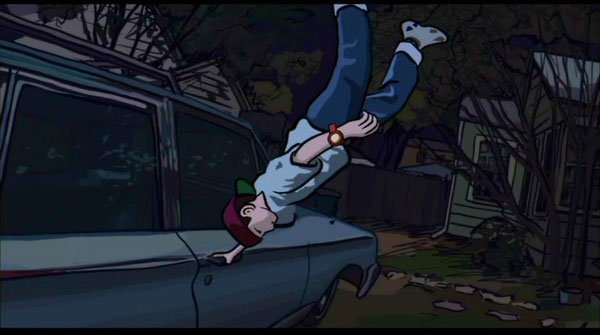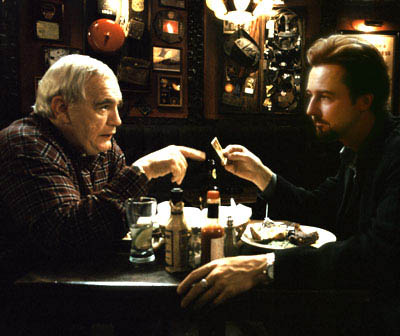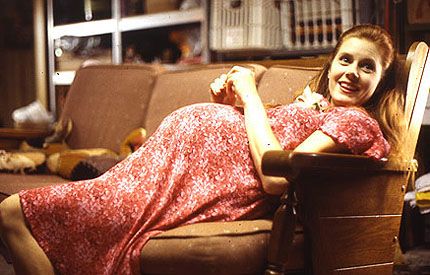Sunday, December 12, 2010
Saturday, August 28, 2010
A Double Feature 5 Years After Katrina
Soft Cat - It Won't Be Long from Friends Records on Vimeo.
My friend Fred posted this amazing music video animated by his sister Miranda Pfeiffer. So firstly, a big congrats to her. I am not sure if she meant the release of the video to coincide with the anniversary of Katrina but the images of the water swelling and engulfing everything + all the news coverage there has been of late about the Hurricane got me thinking.
In particular I thought about The Music Room (1958) by Satyajut Ray. Which I programmed a long way back in a series about Crumbling aristocracies. It's a wonderful mediation on the end of an era, as the lord of manor entertains his friends one last time in his famous music room even as the river threatens to take back the land his castle sits on. Hopefully in the next few days I will think of a double feature about rebirth and rebuilding... so that this Katrina anniversary can end on a slightly more hopeful note.
Wednesday, August 25, 2010
Linkage: For the day (possibly the week or month).
http://www.nytimes.com/2010/08/22/movies/22indie.html?ref=music
Read and be merry.
Sunday, July 18, 2010
SCIENCE FICTION/DOUBLE FEATURE


Both Inception, the new movie by Christopher Nolan, and Jon Turteltaub's The Sorcerer's Apprentice, involve physics
and the human brain's capacity for perception. Both succeed on different levels.
Inception is the first movie by Chris Nolan conceived as an original story since his 2000 hit, Memento, which had the heady premise of presenting your standard neo-noir in backwards order; since then, Nolan has cut his teeth on adaptations -- Insomnia, the two recent Batman movies, and The Prestige. I'm not sure that his storytelling chops have evolved, but what's there can certainly be identified as a personal style, which always seems to involve spinning tricky stories with some sleight of hand and some admittedly charming old fashioned movie magic. In Inception, we're immediately thrust into a world where the invasion of a person's dreams and unconscious mind is a given, a la The Matrix or Eternal Sunshine of the Spotless Mind. At the same time (not unlike Nolan's previous efforts), the plot follows that of a basic heist genre picture, set up as protagonist Cobb's (Leonardo DiCaprio) one "last big score" to get him reunited with the kids he hasn't seen since having to flee "Stateside". He recruits a crew for the job -- an Arthur (loyal partner Joseph Gordon-Levitt), an architect (Ellen Page, also doing extra work as a psychologist in some scenes), a forger (a lively and entertaining performance by Tom Hardy), and a chemist (Dileep Rao), all bankrolled by a new employer (Ken Watanabe) who can guarantee his future amnesty. Lurking in the shadows is a femme fatale in the form of Mal (Marion Cotillard and yes, that is one heavy-handed character name), who may or may not gum up the works. What sets this basic plot apart is that the majority of the action takes place in what are essentially several floors (and a basement) of Cillian Murphy's subconscious house of a mind (which also brings us into Being John Malkovich territory). The movie toys with this, has its fun, and keeps the audience engaged, albeit on an intellectual plane rather than an emotional one. While a lot of talky talk exposition gets unpacked (one of the drawbacks of sci-fi in general), it's kept to a minimum; the filmmakers are confident enough to rely on their visuals, which are enjoyable in details big (such as Page's quick read of what she can manipulate via the physics of the dream world) and small (the joke of explaining "the kick" by subjecting Gordon-Levitt's character to successive pratfalls, or Hardy's transformation into Tom Berenger via clever cutaways to various mirrors). JG-L gets to perform some of the more exhilarating effects work, in a scene -- probably the movie's best -- that moves from a fist fight in a rotating corridor to free-floating in the same environment to solve yet another dream conundrum (take that, 3-D!). Overall, it's an entertaining and refreshingly imaginative movie, inventively dazzling while being bereft of any real feeling. The prime example is the explanation of Cobb's angst over his relationship with Mal: You get the impression that our hearts are supposed to go out to this doomed affair, but like so much of the narrative not directly dealing with the main event, it only serves as more distancing backstory. The best you're going to get is the chemistry teased out between Hardy and Gordon-Levitt's characters, who seem ready for their own Oceans series. In line with the rest of Nolan's oeuvre, you're better off not overworking the 10% of your brain used in regard to the big dreamy ideas (or the length -- a James Bond ski chase sequence taxed my watch-glancing resistance) and just enjoying the small spinning top.
The Sorcerer's Apprentice, while being of more modest means (and, as the latest Cage/Bruckheimer co-lab, that speaks volumes), may arguably be the more rewarding experience: After an awesome voiceover intro by Ian McShane (can we just have him introduce everything from now on?), an unlikely "I make music with my Tesla coil" genius Dave (a winning Jake Cherry at 10 years old, then Jay Baruchel at 20, giving Michael Cera and Jesse Eisenberg some much needed competition) gets recruited by "Merlinist" magician Balthazar Blake (but really, they could've just named him "Nicolas Cage"), discovers he is -- wait for it -- "The Prime Merlinian" (LOL), and learns how to use more than 10% of his brain not to manipulate dreams but to blow shit up and get the girl. How does physics get explained in this, you may ask? Physics = Magic. Done. Seriously, Nic and the writers (based on a Goethe poem!) make it that easy for the audience. The rest is Alfred "Horvath (whore bath?)" Molina relishing his role as the baddie and forcing several Cage matches to ensue, involving floating sword fights, an urn with a ten year imprisonment expectancy (to the day), a dragon, a Russian nesting doll, an ashy Alice Krige and a Chrysler building gargoyle that knows how to get to Paris. Oh, and I forgot -- broomsticks. It's Maaaagic! All you have to do is get past the complete implausibility of a WNYU dj playing a Jonas Brothers-esque song on the New Afternoon Show. While the best magic is performed in getting our hero from Washington Square Park to the Chrysler Building in mere seconds, The Sorcerer's Apprentice makes the perfect palate cleanser to the high concept ambitions of Inception.
Sunday, March 28, 2010
"Double Take" and "Mundane History"

Double trouble Hitchcock meets himself in this allegorical satire
Double Take begins with Alfred Hitchcock explaining, in the footage of his 1966 interview with François Truffaut, the term "MacGuffin":
It might be a Scottish name, taken from a story about two men in a train. One man says "What's that package up there in the baggage rack?", and the other answers "Oh that's a McGuffin". The first one asks "What's a McGuffin?". "Well", the other man says, "It's an apparatus for trapping lions in the Scottish Highlands". The first man says "But there are no lions in the Scottish Highlands", and the other one answers "Well, then that's no McGuffin!".Turns out Hitchcock himself - here either played by a famed look-alike (the late Ron Burrage), or assembled from amusing fragments of his TV and other public appearances, and is pitched against a double of himself (a character that "he must kill" in an imaginative re-edit of Psycho) - is the McGuffin, in what turns out to be an impressionistic, insightful, and all-too-often hilarious commentary on Cold War politics.
Belgian filmmaker Johan Grimonprez's mockumentary charts the fierce relationship between America and Russia like a TV show: with Nixon and Nikita Khrushchev essentially cast as the fictional Hitchcock double, while, by some inspired combination of montage and voiceover, Folgers instant coffee is paralleled with murder poison, and The Birds the Cold War threat. It all culminates into Donald Rumsfeld's infamous McGuffin metaphor. Oh, who'd have thought?
On a similar if totally unrelated note, Thai director Anocha Suwichakornpong's feature debut, Mundane History, is another movie that only takes its synopsis as a jumping board to something much more profound. In this Tiger Award winner at the recent Rotterdam Film Festival, what started out as a simple story between a rich, young man (paralysed from the waist down in an accident) and his male nurse (who gradually comes to break down his patient's resentful facade) eventually turns on its head and becomes something entirely different.
While its disjointed timeline may appear gimmicky at first, Mundane History slowly reveals its (literally) cosmic scope, spinning off into a philosophically perplexing take on personal emotions and illusions, traditional family structure and class distinction, political history of power and bloodshed, as well as a shockingly hynoptic double take on life and death. The young protagonist's injury remains unexplained - the McGuffin amid Suwichakornpong's meditation of an incomparably greater scope.
Wednesday, January 20, 2010
Their top 10s of the 2000s

Jia Zhangke:
01 Colossal Youth
02 Elephant
03 Millenium Mambo
04 Nobody Knows
05 Yi Yi
06 Secret Sunshine
07 Uzak
08 I Don't Want to Sleep Alone
09 Summer Palace
10 Syndromes and a Century
Kiyoshi Kurosawa:
01 War of the Worlds
02 A History of Violence
03 Mystic River
04 Notre Musique (Dir JL Godard)
05 L'enfant
06 Eureka
07 Death Proof
08 Platform
09 The Host
10 The Bridesmaid (Dir Claude Chabrol)
Bong Joon-ho:
Zodiac
A History of Violence
No Country for Old Men
Still Life
Jellyfish
Woman on the Beach
Punch-Drunk Love
The Class
Hunger
A Brand New Life (Dir Ounie Lecomte)
Shinji Aoyama:
Jean Bricards' Itinerary (Dir Huillet & Straub)
Our Music (Dir Godard)
War of the Worlds (Dir Spielberg)
Death Proof (Dir Tarantino)
Woman on the Beach (Dir Sang-soo)
Merde (Dir Léos Carax)
Gran Torino (Dir Eastwood)
The Darjeeling Limited (Dir Anderson)
Four Nights with Anna (Dir Skolimovski)
Romance of Astree and Celadon (Dir Rohmer)
Asia Argento:
Irréversible
Werckmeister Harmonies
The White Ribbon
Fuck Me
Visito Q
Tarnation
Zodiac
There Will Be Blood
Elephant
Apocalypto
Quentin Tarantino:
01 Battle Royale
(Then the rest in alphabetical order)
Anything Else
Audition
Before Sunset
Cabin Fever
Lost in Translation
Shaun of the Dead
Team America
There Will Be Blood
Unbreakable
And finally, Les Cahiers critics' top ten:
01 Mulholland Drive
02 Elephant
03 Tropical Malady
04 The Host
05 A History of Violence
06 The Secret of the Grain, Abdellatif Kechiche
07 Tie Xi Qu: West of the Tracks, Wang Bing
08 War of the Worlds
09 The New World
10 Ten
Thursday, January 14, 2010
Ken's 10 will get you 20 in 2010:







Wednesday, January 6, 2010
The Double Featurette Awards 2009 (Edmund's picks)

Best Feature Film:
Best Documentary:
The Beaches of Agnes & Anvil! The Story of Anvil
Best Director:
Claire Denis for 35 Shots of Rum & Lu Chuan for City of Life and Death
Best Performance by an Actress:
Penélope Cruz in Broken Embraces & Charlotte Gainsbourg in Antichrist
Best Performance by an Actor:
Michael Stuhlbarg in A Serious Man & Nicolas Cage in The Bad Lieutenant: Port of Call - New Orleans
Best Performance by an Animal:
The iguanas in Bad Lieutenant: Port of Call New Orleans & the pink flamingos in My Son, My Son, What Have Ye Done
They manage to leave an indelible mark on your memory without even acting; now that's what I call screen presence. (Side note: this category was set up because I can't tell the genders of iguanas. And flamingos.)
Biggest Unintended Joke in a Feature Film:
The Sigur Ros reference in Ondine & Aaron Kwok in Murderer
Ondine has something to do with gibberish and mermaid... while Cantopop singer-turned actor Aaron Kwok gives an over-acting masterclass.
Most Underrated Feature:
Broken Embraces & Coco Chanel & Igor Stravinsky
It's not Almodovar's fault that his excellent film features the same plot elements as every other film on his CV (he's a fucking auteur!). Just as it's not Jan Kounen's fault that he's making an atmospheric mood piece instead of an old-school biopic with his two famed protagonists.
Most Overrated Feature:
Avatar & The White Ribbon
Not that I didn't consider these decent movies. But how innovative can you call a rehash of Pocahontas, Dances with Wolves, and Princess Mononoke? And does hinting at your film's opening that you're adressing the roots of extremism necessarily mean that you're addressing the roots of extremism in your film?
Most Uncanny Combo:
Orphan & Murderer
Opening in Hong Kong within a four-week period, each of these two horror flicks features an utterly ridiculous and outrageously incredible plot twist. You want to know what's truly amazing? The two big twists are the same.
The Guiltiest Pleasure:
Slumdog Millionaire & Love Exposure
I thought it was bad enough to be thoroughly entertained by a poverty porn. And then I fell hopelessly in love with a four-hour epic teenage love story on transvestite, religious cult, incest, ultra-violence, and upskirt photography.
Most Pointless Feature:
Nine & Blood: The Last Vampire
Nine is a film adaptation of a Broadway musical adapted from an all-time classic movie - minus all the elements that made the latter great in the first place; while Blood is a live-action adaptation of an animated short film - whose newly added plotlines are so mind-numblingly nonsensical they actually contradicted the original premise. Quite a feat.
Biggest Disappointment:
Face & Trash Humpers
Does it not tell you something that I had as little fun watching Laetitia Casta dance around naked as I did seeing Harmony Korine hump trash in a creepy mask? Honourable mention goes to Lou Ye for the relentlessly dark Spring Fever. In fact, his film is so dark I couldn't even tell an actor's face from another's.















